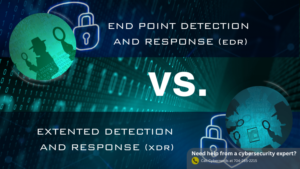In the ever-evolving landscape of cybersecurity, organizations are constantly seeking the best solutions to protect their critical data and assets. Two prominent contenders in this arena are Endpoint Detection and Response (EDR) and Extended Detection and Response (XDR). While both offer robust threat detection and response capabilities, they differ in several key aspects.

EDR: Focus on the Endpoint
Benefits of EDR:
- Deep Visibility into Endpoint Activity: EDR solutions provide a comprehensive view of endpoint activity, making it easier to detect anomalous behavior and suspicious activity.
- Rapid Threat Detection and Response: EDR tools can quickly identify and respond to threats, minimizing the damage they can cause.
- Automated Incident Response: EDR solutions can automate routine tasks, such as isolating infected endpoints and collecting forensic data, freeing up valuable time for security teams.
XDR: A Unified Approach
Benefits of XDR:
- Improved Threat Detection: XDR can detect threats that might be missed by individual security solutions by correlating data from multiple sources.
- Reduced Security Silos: XDR breaks down silos between different security tools, allowing for a more coordinated and effective response to threats.
- Simplified Security Operations: XDR simplifies security operations by providing a single platform for managing all security data and activities.
So, which is better?
EDR is a good choice for organizations that:
- Have a large number of endpoints to manage
- Need detailed visibility into endpoint activity
- Require rapid threat detection and response capabilities
XDR is a good choice for organizations that:
- Have a complex IT environment with multiple security solutions
- Need a comprehensive view of their security posture
- Want to simplify security operations
The Future of Cybersecurity
Here are some additional factors to consider when choosing between EDR and XDR:
- Cost: XDR solutions can be more expensive than EDR solutions due to the additional features and functionality they offer.
- Security Expertise: XDR requires more security expertise to implement and manage effectively.
- Integration: XDR solutions need to integrate with other security tools in your environment.
It is important to carefully evaluate your organization’s specific needs before choosing between EDR and XDR. By doing so, you can ensure that you are investing in the best possible solution for your security needs.
In conclusion, both EDR and XDR are powerful tools that can play a vital role in your organization’s cybersecurity strategy. However, XDR offers a more comprehensive and unified approach to security, making it the better choice for organizations that are looking to take their security posture to the next level.





